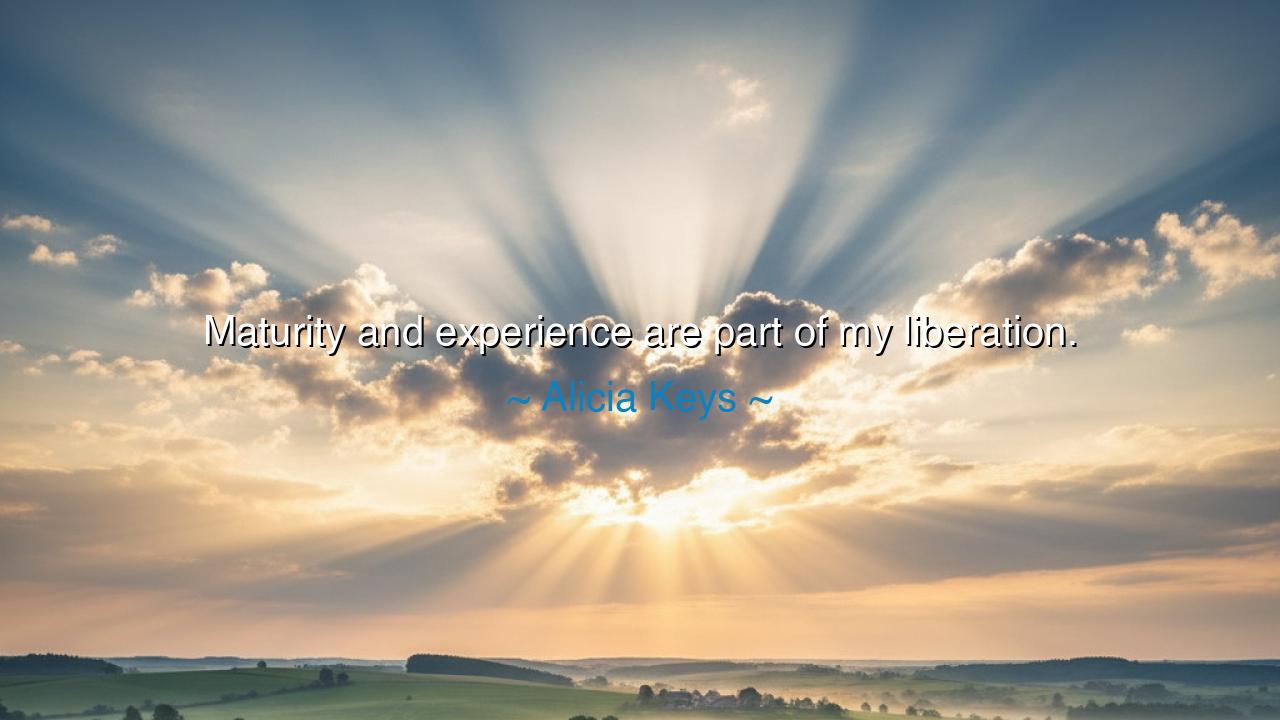
Maturity and experience are part of my liberation.






Host: The studio was dimly lit — all soft gold and shadows — the kind of light that made everything feel intimate, unfinished, alive. In the center of the room sat a grand piano, its black lacquer surface reflecting faint traces of city light from the wide loft windows. Outside, the skyline pulsed faintly in the night — a living rhythm that matched the quiet, steady thrum of rain against the glass.
Jack stood near the window, his sleeves rolled up, hands tucked in his pockets, staring down at the city as if trying to read the world’s pulse. Jeeny sat at the piano, her fingers resting lightly on the keys, not playing yet — just listening to the silence, the anticipation.
Jeeny: “Alicia Keys once said, ‘Maturity and experience are part of my liberation.’”
Host: Jack turned slightly, his grey eyes catching the light, voice low and thoughtful.
Jack: “Liberation. Funny word. Sounds like freedom, but with scars.”
Jeeny: (smiling softly) “Exactly. Liberation’s not about breaking out — it’s about breaking open. Maturity gives you that.”
Host: The sound of rain deepened, soft but persistent, like the percussion of memory.
Jack: “So, she’s saying age doesn’t cage her — it frees her?”
Jeeny: “Yes. Because when you’ve lived enough, you stop asking permission to be who you are. That’s what experience does. It teaches you which cages you built yourself.”
Jack: “And which ones were built for you.”
Jeeny: (nodding) “Exactly. When you’re young, you mistake rebellion for freedom. When you grow, you realize liberation is quieter — it’s the moment you no longer need to prove anything.”
Host: Jeeny’s fingers drifted lightly over the keys, striking a few soft chords — the sound lingered like something half-remembered.
Jack: “That’s what I envy in artists like her. They age into authenticity instead of away from it.”
Jeeny: “Because they’ve earned it. Experience strips you down until only truth fits.”
Jack: “You think pain is required for that?”
Jeeny: “No. But pain speeds it up.”
Host: Jack laughed, short and low, shaking his head.
Jack: “So liberation’s just maturity rebranded — dressed in wisdom instead of youth.”
Jeeny: “Not rebranded. Reclaimed. Maturity isn’t the enemy of youth — it’s the evolution of it. You stop performing. You start living.”
Host: The rain beat harder now, the city lights flickering across the window panes. Jeeny began to play softly — a slow, soulful progression that filled the room with warmth.
Jack: “You ever notice how liberation doesn’t come with fireworks? It comes with exhale.”
Jeeny: “Yes. That first deep breath after years of holding one.”
Jack: “And that’s what she means by experience — that the struggle becomes instruction, not identity.”
Jeeny: “Exactly. You stop saying, ‘Look what happened to me,’ and start saying, ‘Look who I became.’”
Host: The piano melody deepened, her fingers finding the rhythm between melancholy and light.
Jeeny: “Liberation isn’t the absence of fear. It’s the decision to walk through it anyway — to make art, to speak truth, to stop shrinking.”
Jack: “You sound like you’re quoting her songs now.”
Jeeny: “She lives what she writes. You can hear the evolution in her voice — the way it’s not about impressing anymore, it’s about expressing.”
Host: Jack leaned against the piano, watching her play, his tone softer now — stripped of irony.
Jack: “You ever feel that kind of liberation?”
Jeeny: “I think I’m learning it. You don’t wake up free — you practice it. Every day, in small ways.”
Jack: “Like what?”
Jeeny: “Like saying no without guilt. Like forgiving yourself faster. Like wearing silence as strength instead of shame.”
Host: Jack smiled faintly, the kind that hides understanding behind humor.
Jack: “That’s maturity talking.”
Jeeny: “No — that’s survival turned into grace.”
Host: Outside, thunder rumbled softly, far away — the world’s slow applause for their honesty.
Jack: “You know, the younger me thought liberation was escape — new jobs, new cities, new people. But the older I get, the more I realize it’s just peace. The kind that doesn’t need motion.”
Jeeny: “Exactly. The kind you can only earn through falling, failing, forgiving.”
Jack: “So experience is the cost of calm.”
Jeeny: “And maturity is the receipt.”
Host: Jeeny’s melody paused, her hands resting quietly on the keys.
Jeeny: “You know what I love about her quote? It’s not triumphant. It’s humble. Liberation isn’t arrival — it’s awareness.”
Jack: “The awareness that you were never really trapped — just unfinished.”
Jeeny: “Yes. And that’s the most beautiful kind of freedom.”
Host: The piano tone faded into the hush of rain, the room heavy with stillness and light.
Jack: “So, Alicia’s liberation isn’t rebellion — it’s reconciliation.”
Jeeny: “With herself, with time, with the woman she’s become.”
Jack: “And with the girl she used to be.”
Host: The two shared a look — soft, knowing — that silent communion between those who’ve outgrown the need to be understood.
Jeeny smiled.
Jeeny: “That’s the real music, Jack — when you finally harmonize with your own past.”
Host: The camera slowly drifted back, the rain easing into a shimmer on the glass. The city beyond pulsed with distant lights — steady, unbothered, alive.
Inside, Jeeny began to play again, this time lighter, freer — her melody a quiet celebration of everything survived and everything still unfolding.
And as her song filled the space, Alicia Keys’ words settled into the rhythm — clear, grounded, luminous:
“Liberation doesn’t come from running — it comes from returning, wiser, to yourself.”
Host: The final note lingered, glowing in the silence like truth — gentle, mature, and utterly free.






AAdministratorAdministrator
Welcome, honored guests. Please leave a comment, we will respond soon